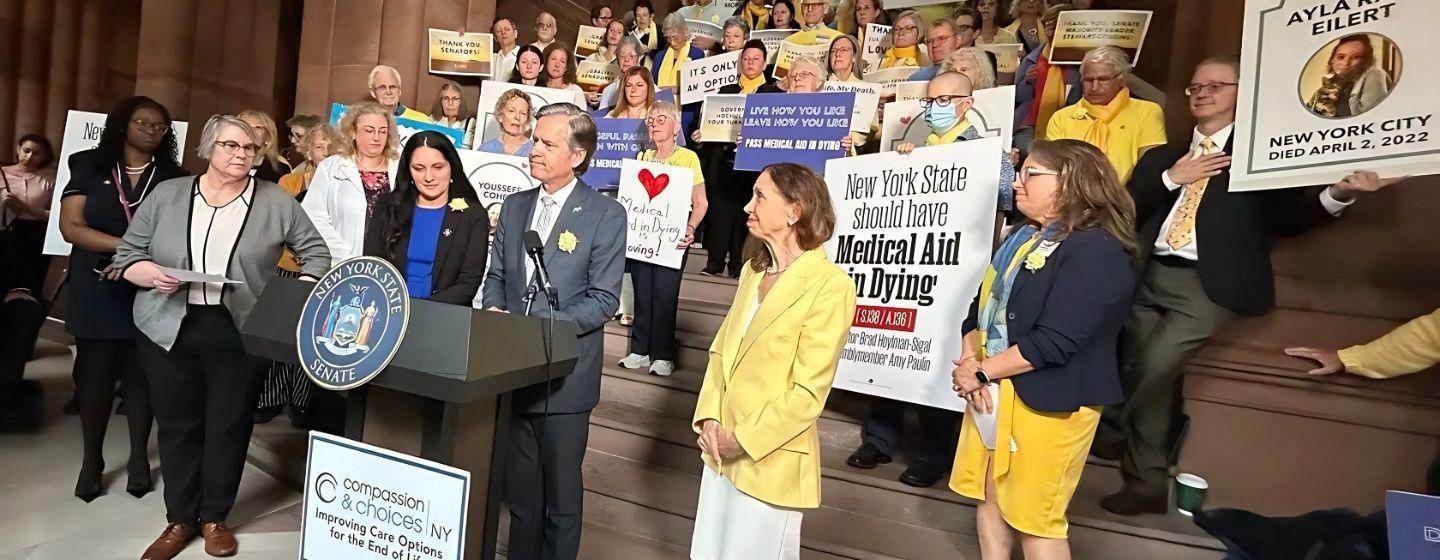NY Lawmakers Pass Medically Assisted Suicide Bill

New York state senators approved a bill Monday that would give people with terminal illnesses the legal right to end their own lives, though it remains unclear whether Gov. Kathy Hochul will sign it into law.
The state Senate voted 35-27 in favor of the Medical Aid In Dying Act, which would allow patients to request a lethal prescription if they have an incurable diagnosis that leaves them with six months or less to live.
The state Assembly approved the measure in late April. But Hochul, a Democrat who has final say over whether the bill will become law, has given no indication whether she supports it.
Should Hochul approve the bill, New York would become the 12th state to allow medically assisted suicide in some form.
“Governor Hochul will review the legislation,” said Avi Small, the governor’s spokesperson.
Supporters of the bill, including family members who have watched loved ones suffer at the end of their lives, spent years pushing for its passage. They often lined the halls of the state Capitol in yellow shirts while asking lawmakers for their support, and argued the bill would permit people to die on their own terms instead of succumbing to illnesses that could rob them of their quality of life.
Among those who were at the Capitol on Monday was Daren Eilert, whose daughter, 24-year-old Manhattan resident Ayla Rain Eilert, died a painful death from cancer three years ago.
"That level of pain, to watch someone suffer at that level, is incredible,” he said. “And that's why I'm here today, because Ayla never wanted to see anyone suffer."
Opponents of the measure, including the state’s Roman Catholic bishops, see it as a moral affront that devalues human life and is ripe for abuse. They waged a furious last-minute lobbying push in hopes of flipping a few senators to their side. Robert Bellafiore, a spokesperson for the New York State Catholic Conference, called it “the most morally profound and impactful, consequential vote these lawmakers will probably make in their entire careers.”
Republicans voted unanimously against the bill.
“I admire the compassion component of this bill, but there are just too many aspects that are bad about this,” said state Sen. Steve Chan, a Republican from South Brooklyn. “There’s no oversight, and I’m going to have to vote no on behalf of my district.”
Ultimately, the advocates for the bill prevailed, convincing enough Democratic senators to support the measure and Senate leadership to advance it to the floor for a vote.
If signed into law, the bill would apply to any patient diagnosed with an “incurable and irreversible illness or condition” that, according to "reasonable medical judgment," is estimated to kill them within six months.
Two separate physicians must certify the patient is eligible for medically assisted suicide. If either determines the patient “may lack decision-making capacity” for any reason, they are required to refer them to a mental health professional for further evaluation. Otherwise, a mental health check is not required.
The patient would have to request a lethal prescription from their attending physician, and two witnesses must sign a declaration saying the patient signed the request voluntarily and without being coerced by anyone, according to the bill.
The witnesses have to be adults who either personally know the patient or checked their identification. They also cannot be a member of the patient’s family or someone who is set to receive an inheritance. The witnesses cannot own or be employed at a nursing home or similar facility where the patient receives care.
The Assembly approved the measure by an 81-67 vote in April — a relatively narrow margin, as bills require 75 votes to pass in the Democrat-dominated chamber. It was a similarly narrow, largely-party-line vote in the Senate, where bills require 32 votes to pass.
Several Democrats voted against it in both chambers, including Assembly Majority Leader Crystal Peoples-Stokes of Buffalo; Assemblymember Rodneyse Bichotte Hermelyn, who chairs the Brooklyn Democratic Party; and state Sens. Cordell Cleare, Roxanne Persaud and Sam Sutton of New York City.
Some of them raised concerns about the potential for patients to be coerced into ending their lives, particularly if they’re a person of color from a low-income background.
“My concern and opposition to this bill comes from the great risk of targeting vulnerable communities of color given the historical health disparities that they continue to face,” Bichotte Hermelyn said on the Assembly floor.
The bill is sponsored by Assembly Health Committee Chair Amy Paulin, a Westchester Democrat, and state Sen. Brad Hoylman-Sigal, a Manhattan Democrat. While advocating for the bill, lawmakers shared personal stories about their own experiences with dying loved ones.
“ I think my colleagues have come to the conclusion that medical aid in dying isn't so much about ending a person's life but shortening their deaths,” Hoylman-Sigal said.
Now, the same advocates who convinced lawmakers to approve the bill — many of whom are allied with a group known as Compassion & Choices, which pushes for similar laws nationwide — will turn their attention to Hochul.
“ We are hoping that she signs it, but we have no indication one way or the other,” said Hoylman-Sigal, who said he’s had “informal conversations” with the governor about the issue. “Like most bills, the governor will tell you that she'll look at it when it reaches her desk.”
Lawmakers passed the legislation in what is the final full week of the Capitol's annual legislative session, a period in which the Legislature will pass literally hundreds of bills. The state Senate is scheduled to wrap up later this week, while the Assembly is set to return for a couple days next week to complete its work.
Hochul has until the end of the year to sign or veto the bills, including the Medical Aid in Dying Act.
This story was updated after the bill passed the Senate.
THIS ARTICLE WAS ORIGINALLY PUBLISHED BY GOTHAMIST.
Related

Schumer: Snap Cuts Expected To Worsen Food Insecurity in Central New York
Sen. Chuck Schumer (D-NY) is calling the Trump administration’s “One Big Beautiful Bill” an “ugly” bill.


